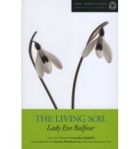A coincidence. I was planning this post on Lady Eve for Organic September when environmental journalist and historian, Erin Gill, passed through Bristol.
“Eve Balfour,” said Erin Gill, emphasising the word, Eve, as we sat in the Better Food Company cafe today.
Eve is what her friends and family called her. The title was expedient, thought Erin. Certainly useful when campaigning for counter-culture sustainable farming. (Eve’s title was inherited from her childless uncle, Arthur, the first Earl of Balfour, responsible for the Balfour declaration).
But I feel frustrated! Why are these perfectly sane, common sense ideas deemed unorthodox in the first place? As Shell prepares to drill in the melting Arctic, I despair about this terrible struggle for long-term care to prevail over short-term profits.
It’s not through want of vision.
Eve Balfour wrote The Living Soil, published in 1943 – a synthesis of emerging thoughts linking sustainable farming to health – and co-founded the Soil Association in 1946 to spread the word.
Organic historian, Philip Conford, author of The Origins of the Organic Movement, and The Development of the Organic Network: linking people and themes (1945 – 1995), wrote in the Soil Association’s Living Earth in 2003 (when I was editor):
“To the general public, the Soil Association’s name may seem narrowly focused: surely soil matters only to farmers and gardeners. The answer is no, it matters to everyone who eats and all who are concerned with health.”
The reasons, he writes, are given in
Eve Balfour’s book, The Living Soil (reprinted 2006).
The book helped kickstart the organic movement – a rising tide of hearts and minds from both the left and right of politics which questioned quick-fix chemicals, animal factories and the monocultures of factory farming. Their prophetic vision foretold a depleted soil with negative knock-on effects.
The organic pioneers called for biological and ecological sciences to underpin farming, not the increasingly-dominant chemistry one (which sadly gained more sway from developing munitions in two world wars).
To me, these organic pioneers were inspiring, standing up for nature against the increasing industrialisation of the west.
Eve Balfour speaks my language.
In the first edition of the Soil Association’s magazine, Mother Earth (1946) Eve Balfour wrote about those who questioned the status quo:
“…They are beginning to understand, for example, that health is something more than than just not being ill, and that the right approach to health consists not merely in the prevention of disease but in the promotion of vitality in both organism and environment, for the one cannot be studied apart from the other.
“These people have begun to see life on this planet as a whole, and Nature’s plan as a complicated system of interdependence rather than one based on competition.”
Soil health equals human health, as this Huffington Post film review of the Symphony of the Soil (we helped organise its London premiere), shows.
However, despite its benefits, organic farming receives little UK government support compared to other countries in Europe. What a terrible shame – organic food should be available and affordable for all, for the sake of soil, water conservation, animal welfare, bees and other wildlife, wild flowers, and our health.
Everything is interdependent.
Post Script A recent review from Stanford University indicated organic food may have less pesticides but is not more nutritious than non-organic food.
The review (and the ensuing media frenzy) is rebutted by US scientist, Dr Charles Benbrook.
This article on the NHS website also looks at the Standford review’s methodology.
And, a great response from food writer, Michael Pollan.
I like this rant from Riverford Farm about organic food getting knocked just when it’s never been better.




After publishing this post, this title came to me (too late): All About Eve. But maybe it is too cheesy.
I want to add that Eve Balfour is in a class of inspired early 20th-century thinkers for whom I feel gratitude and kinship. They include the author, DH Lawrence, the psycho-analyst, Wilhelm Reich, and the educationalist, AS Neill.
Look, I am not saying they are perfect human beings. But they stand for trust-in-life (rather than authoritarian control).
LikeLike
Whether or not organic food is better for you than non-organic food, its practices surely should be adopted? People growing their own veg is organic – usually – and this should definitely be encouraged!
LikeLike
I couldn’t agree with you more, Rick. Instead of arguing over research results or waiting for the science that will prove it either way, why not implement what is already proven to be good for wildlife, animals and the soil!
It’s like climate change – instead of waiting to prove it (or not), why don’t we work towards living a more sustainable and less wasteful world. What is there to lose? And how much is there to gain!
LikeLike
It’s so true. Nature works because it has created the equilibrium, with the natural checks and balances that comes with such a system.
Man likes to think that we can tackle a ‘problem’ with a enforced ‘solution’ – I remember DDT being seen as a saviour when it was introduced but of course no-one thinks that now. We have to learn to work with nature, and not to see it as something to be tamed. How amazing that they saw that as early as the 1940s.
Organics will win through, in spite of Stanford University and its ilk.
LikeLike
Many thanks for sticking up for nature.
And as for DDT, yes,indeed banned.
But – tragically, neonicotinoid pesticides are 7,000 more toxic than DDT.
Linked to the dramatic loss of bees, here’s the Bee Lovely petition to UK government to BAN neocotinoids.
But still I ask: why are we having to spend our lives fighting for things that are so damn obvious?
LikeLike
Organic food I think is better for you because of the positive ways that it uses land in farming as the film Symphony if the Soil demonstrated. I have stuck by the organic principles in my allotment and it has worked wonders over the past year. It creates a natural balance and promotes wildlife so how can this not be better for you and your surrounding environment?!
LikeLike
Hi Laura
Thanks so much for your comment and your report on the practical results of sticking to organic principles on your allotment.
All farming depletes the soil. So far better a system that puts back what it takes out, as organic farming does.
As opposed to chemical farming which uses quick-fix chemical fertiliser much that ends up in polluting run-off in our waterways (which by the way we as taxpayers end up paying for).
I remember Gundula Azeez, previous policy manager of the Soil Association, describing the differences between chemical vs organic farming as the differences between feeding the soil with factory-made dietary supplements vs healthy food.
LikeLike
So wonderful that you have written about Eve Balfour! There are some who are quick to point out that she wasn’t an ‘original thinker’, and that the ideas she expressed in her war-time bestseller, The Living Soil, weren’t ‘hers’. Eve was the first to admit this.
Having researched Eve Balfour’s life and career, what I feel she excelled at was inspiring those she encountered with the organic movement’s vision – of healthy soil as the foundation for healthy food, which, in turn, makes for healthy people.
The idea that our health depends on the quality of our food is strongly resisted – perhaps because it is so simple and powerful. Producing food of the nutritional quality we need for good health over many decades requires care, ingenuity, and commitment…year after year.
LikeLike
Thank you, Erin, and for your alive interest in Eve Balfour. She was clearly an inspirer. Look, she still inspires us!
I liked what you said about an idea – in this case how the quality of food affects our health – being resisted perhaps because it is simple and powerful.
Erin, please keep us posted about the possibility of publishing your PhD thesis of Eve Balfour – perhaps as an e-book (e-books being my latest obsession…).
LikeLike
Thanks for bringing this to the public domain. In time people like you fightng for our cause will rip the fruits of your labour!!
LikeLike
Hi Nina
Good to hear from you again. Yes, hopefully in time we will reap the fruits of our labour – or at least know we tried!
Elisabeth
LikeLike
I was reminded about the impacts of chemical pollutants yesterday as I read Miriam Darlington’s excellent new book Otter Country (Granta) – the effect on mammals, even those at the ‘top’ of the food chain, especially those living in/ near watercourses, has been devastating.
LikeLike
Mark, thanks. And for pointing us to Miriam Darlington’s Other Country – in search of the Wild Otter (Granta).
It’s so important to keep talking about the devastating effects of a farming system – that is not necessary! there are sustainable ways to produce sufficient food.
Even though we might feel like at times like deranged Cassandras…
And congratulations on the publication of your book, Counting Steps (Cinnamon Press), which also allies human honesty and nature – and clearly we need more of that to make the world a saner place.
LikeLike
I don’t need to feel food is “better” for me, the benefits of food are self evident, but I do like to know food is not doing me (or anything else) any harm,and it is delicious, So I don’t like added chemicals, I don’t like food that is intensely farmed, and I do like it as nature intended.
LikeLike
Pingback: URL